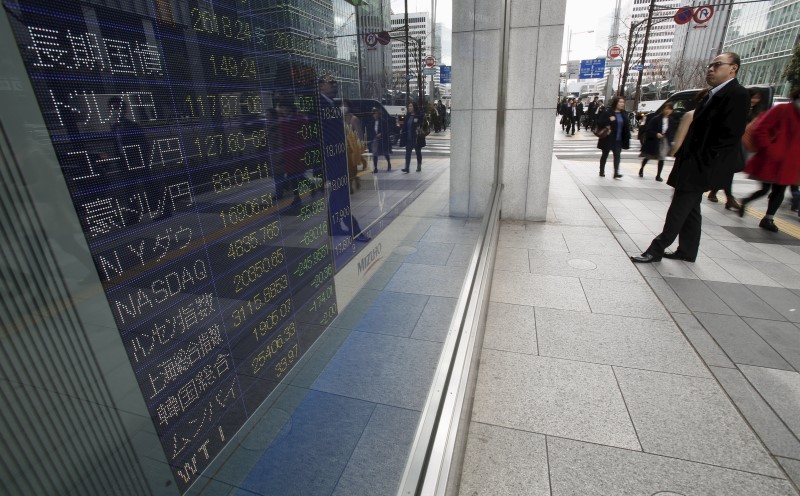By Lu Jianxin and Patrick Graham
SHANGHAI/LONDON (Reuters) - China allowed the biggest fall in the yuan in five months on Thursday, pressuring regional currencies and sending global stock markets tumbling as investors feared it would trigger competitive devaluations.
For the second time this week China's stock markets were suspended for the day before an announcement late in the evening in Shanghai that authorities were abandoning the new circuit-breaking mechanism for halting trade in overly volatile markets.
That heightened anticipation about how Chinese markets may respond on Friday.
The People's Bank of China shocked traders by setting the official midpoint rate on the yuan, also known as the renminbi (RMB), 0.5 percent weaker at 6.5646 per dollar on Thursday, the lowest since March 2011.
That tracked record losses in the more open offshore currency market and was the biggest daily fall since an abrupt devaluation of nearly 2 percent last August.
But dealers said the PBOC had then intervened heavily to reverse a more than 1 percent fall in offshore rates for the yuan after they hit a record low of 6.7600 per dollar.
The yuan took back all of its losses to stand a quarter of a percent stronger at 6.6755 in European and U.S. trade.
"It's very similar to the previous round (in August) where they weaken the official rate and then intervene against the dollar offshore to beat back the speculators," said a yuan trader with one international bank in London.
"That would be a way of starting to stabilize the market."
The PBOC's China Foreign Exchange Trade System (CFETS) repeated on Thursday that there was no basis for the yuan's continuous depreciation and that it was stable against a basket of currencies in 2015.
But the central bank's fixings have also helped drive the yuan down this week against other major currencies, including a 3.5 percent fall against the yen and 0.8 percent against the euro.
That raised concerns that China might be aiming for a competitive devaluation to help its struggling exporters.
"That's the fear of the market," said Sim Moh Siong, FX strategist for Bank of Singapore, adding that it was a zero sum game as other currencies weakened in response, and the end result would be greater volatility.
Others were unsure what policy Beijing was pursuing.
"Frankly speaking, we are still not quite sure where the PBOC boundary is at the current stage," said Singapore-based Oversea-Chinese Banking Corporation (OCBC).
"The fear of the unknown has become the largest risk for RMB in the near term, despite China's sizable current account surplus."
The Australian dollar, often used by foreign exchange dealers as a liquid proxy for the yuan, fell more than half a U.S. cent. The Korean won, however, recovered almost all of its initial falls with banks saying the Bank of Korea had probably also intervened to support the currency.
OCBC noted that against a basket of currencies, the RMB index was still only fractionally down for 2016.
ANZ bank said in a note that the PBOC's action would nevertheless "create one-way expectation of RMB depreciation, propelling capital flight and leading to significant financial instability".
DECLINING RESERVES
Data on Thursday showed China's foreign exchange reserves fell by the most on record last month, down $108 billion in December alone and by $513 billion overall last year.
That suggests an accelerating outflow of money from China which may largely be the result of the opening up of its financial markets over the past year, but also a sign that the world's second-largest economy is in deepening trouble.
Michael Every, Rabobank's Head of Markets Research, Asia-Pacific, said once Beijing had won the diplomatic triumph of getting the yuan included in the International Monetary Fund's reserve currency basket in November, he expected policymakers would let it slip to cope with a slowing, deflationary economy.
"Why people are panicked is because (i) they didn't see this coming, and/or (ii) the global economy needs a consumer of last resort, and China is sending a signal that they won't be it," he added.
A sustained depreciation in the yuan puts pressure on other Asian countries to weaken their currencies and makes commodities denominated in U.S. dollars more expensive for Chinese buyers, which could further depress demand and commodity prices.
Shanghai stocks slid 7.3 percent to trigger the halt in trading, a repeat performance of Monday's sudden tumble. Japan's Nikkei shed 2.3 percent in sympathy, and Hong Kong's Hang Seng Index was down 2.8 percent.
The halt mechanism, intended to calm market volatility, was instead "killing investors" and creating panic, a retail investor in Guangzhou complained.
China's securities regulator also unveiled new rules on Thursday to restrict selling by big shareholders who have been locked into their holdings for six months since Beijing banned them from offloading stocks to arrest a summer market crash.
In rules that take effect on Jan. 9, they can't sell more than 1 percent of a listed company's share capital every three months.

"This is crazy," said Alberto Forchielli, founder of Mandarin Capital Partners. "Chinese regulators set off on this path in July and they cannot get out of it. They have ruined whatever hope investors still had in the market."